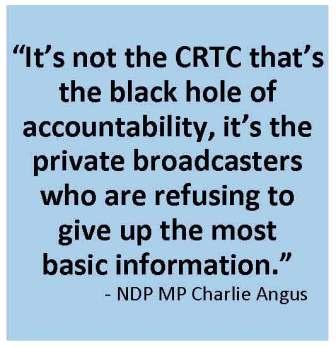
OTTAWA – The CRTC holds dear four key principles: transparency, predictability, fairness and timeliness. As a public institution, the CRTC has a right to provide the public with the clearest possible picture of how it operates and how they can interact with the commission, said chairman Konrad von Finckenstein today.
In his opening remarks during an appearance in front of the House of Commons Access to Information, Privacy and Ethics Committee, the chair acknowledged the committee is interested in how the CRTC deals with access to information and the broadcasters, von Finckenstein said the commission takes this very seriously.
“Our golden rule is quite simply: when in doubt, disclose,” he said.
The commission’s golden rule didn’t seem to sit well with Charlie Angus, the NDP MP from Timmins-James Bay, as he sparred with the CRTC chair over the private broadcasters’ unwillingness to release data when Canadians have supported the private broadcasters through the Canadian New Media Fund and the Local Programming Improvement Fund (LPIF) to the tune of hundreds of millions of dollars. Angus pointed to an access to information request for the financial data of the private broadcasters from 2001 to 2005.
Von Finckenstein said if the data is owned by third parties – the private broadcasters – they can claim confidentiality and therefore the information goes unreleased. The only remedy is to go to court and try and convince the court to force the broadcaster to release the data. In this type of scenario, the CRTC will provide the data under seal to the court. If it is determined that the data must be released, the Commission will do so.
Angus thanked the CRTC chair for the clarification, noting that his past impression of the Regulator as “a black hole of accountability and transparency for all manner of issues” was wrong. “It’s not the CRTC that’s the black hole of accountability, it’s the private broadcasters who are refusing to give up the most basic information,” he said.

Angus highlighted a case from earlier this year that saw Rogers Communications and the CBC agree to release information regarding LPIF funds, but the other broadcasters refused, citing confidentiality. “It seems like a fairly straightforward question that if Canadians are paying millions of dollars to keep the bottom line of a private broadcaster alive, if the taxpayer is paying the full freight, the taxpayer should know,” he asked.
Von Finckenstein reiterated that it’s not up to the CRTC to make a determination on whether certain information should be released or not, if a broadcaster claims confidentiality over that data. “What we do is we administer these funds. We make sure that it is used for the purposes [explained in the program],” he said.
“The companies take the position that if I made that information public, you could do some reverse engineering and you could actually figure out exactly how profitable that local station is or not,” von Finckenstein added. “Whether it’s justified or not, I do not take any position on it. I just say, this is your information, you furnished it to me in confidence and I will respect that confidence.”


